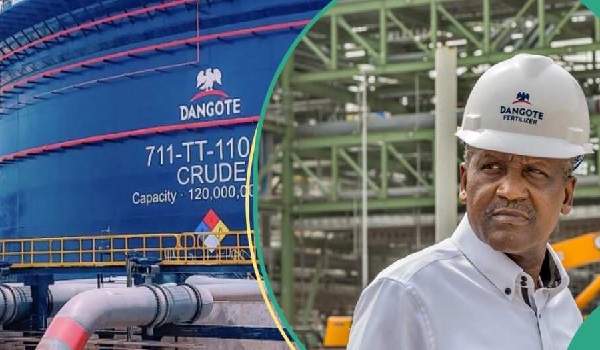The Dangote Petroleum Refinery, with a daily output of 650,000 barrels, is capitalising on the availability of cost-effective oil imports from the United States.
Recent reports from Bloomberg indicate that the refinery, poised to revolutionise the fuel market in Nigeria and the wider region, has commenced product shipments while finalising key units to facilitate gasoline production.
Experts anticipate that Dangote’s entry into the market will wield considerable influence, particularly in the Atlantic Basin gasoline markets.
Alan Gelder, Vice President of Refining, Chemicals, and Oil Markets at Wood Mackenzie, asserts that the refinery’s forthcoming Residue Fluid Catalytic Cracking (RFCC) unit will significantly impact the West African gasoline supply balance.
Presently operating at approximately 300,000 barrels per day, analysts estimate that Dangote Refinery is running at nearly half its designated capacity.
Nevertheless, it has already initiated the shipment of jet fuel, gasoil, and naphtha, signalling a broadening product portfolio.
Wood Mackenzie predicts the activation of gasoline-focused units by summer, although other analysts anticipate the RFCC’s full operation by year-end. Dangote Industries recently announced plans to commence gasoline deliveries in May, further enhancing its market presence.
Ronan Hodgson, an energy analyst at FGE, underscores the refinery’s profound impact on product markets, even in its current operational state. Additionally, units designed to enhance diesel quality are set to commence operations in the near future.
Meanwhile, in a groundbreaking move, Dangote Refinery has announced a reduction in diesel prices from N1,200/litre to N1,000/litre, eliciting excitement within the downstream oil sector. This reduction aims to alleviate economic strains and curb inflation rates.
Bloomberg’s analysis reveals that a significant portion of the oil supplied to the refinery comprises US-grade WTI Midland, indicating a potential ongoing reliance on foreign oil, given its favourable pricing compared to local supplies. However, recent regulatory changes in Nigeria may soon alter this dynamic.
The Nigerian government’s introduction of new regulations mandates that domestic oil producers prioritize sales to local refineries, aiming to diminish reliance on imported refined products. Moreover, refineries can now procure crude using the local currency, further incentivizing indigenous production.
As Dangote Refinery continues its ascent towards full operational capacity, its strategic utilization of US oil imports underscores its pivotal role in reshaping regional fuel dynamics while navigating evolving regulatory landscapes.



